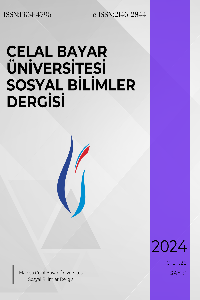Öz
Döngüsel ekonomi, atık oluşumunu en aza indirmeyi hedefleyen, kaynak ve malzeme kullanım ömrünü uzatmayı amaçlayan ve sürdürülebilir bir dünya için yap-kullan-tamir et- tekrar kullan felsefine dayanan şemsiye bir kavramdır. Bu kavramın en önemli unsurlarından birisi sıfır atıktır. Sıfır atık kavramının benimsenmesi için birçok uygulamalar ve politikalar gerçekleştirilmektedir. Bunlardan birisi de sıfır atık afişleriyle farkındalık yaratarak kamuoyunun konuya ilgisini çekmektir. Çünkü sıfır atık uygulamalarının başarılı olabilmesi toplum ve bilimin karşılıklı etkileşimi ile mümkündür. Toplumun sıfır atığı bilmesi ve içselleştirip gündelik hayatında uygulaması amacıyla bu çalışma kaleme alınmıştır. Çalışmada Dumlupınar Üniversitesi Güzel Sanatlar Fakültesi ve Adnan Kahveci Vakfı’nın iş birliği ile gerçekleştirilen "Sıfır Atık" konulu Uluslararası Afiş Yarışması ve Sergisi Projesi’ne gönderilen afişlerden dereceye giren 100 afiş Ronald Barthes’in göstergebilim yaklaşımı ile incelenmiştir. Analiz sonuçlarına göre afişlerde, doğaya en çok zarar veren plastik atıklarının olduğu, plastik kullanımının azaltılması gerektiği, aksi taktirde ekolojik dengenin bozulup kaynakların hızla tükeneceği anlaşılmıştır.
Anahtar Kelimeler
Kaynakça
- Apaydin, Ş. (2020). OECD ülkelerinde atık yönetimi ve ekonomik büyüme ilişkisi: bir panel kantil regresyon yaklaşımı, Third Sector Social Economic Review, 55(1) 300-312. DOI: 10.15659/3.sektor-sosyal-ekonomi.20.02.1288
- Arruda, E. H., Melatto, R. A. P. B., Levy, W., & de Melo Conti, D. (2021). Circular economy: A brief literature review (2015–2020). Sustainable Operations and Computers, 2, 79-86. Doi: 10.1016/j.susoc.2021.05.001
- Akyıl, L. (2023). "Avrupa Birliği’nin Sıfır Atık Uygulamaları", Türkiye’de Sıfır Atık: Tespitler, Beklentiler ve Fırsatlar (Ulusal Kongre), 25-26 Mart 2023, İstanbul Arel Üniversitesi Kongre Bildiri Kitapçığı, Yayım tarihi: Temmuz 2023, 35-50.
Öz
Circular economy is an umbrella concept that aims to minimize waste generation, and is based on the philosophy of build-use-repair-reuse for a sustainable world. One of the most important elements of this concept is zero waste. Many practices and policies are being implemented to adopt the concept of zero waste. One of these is to attract public attention to the issue by raising awareness with zero waste posters. Because the success of zero waste practices is possible with the mutual interaction of society and science. This study was written so that the society can know about zero waste, internalize it and apply it in their daily lives. In the study, 100 winning posters sent to the "Zero Waste" themed International Poster Competition and Exhibition Project, which was held in cooperation with Dumlupınar University Faculty of Fine Arts and Adnan Kahveci Foundation, were examined with Ronald Barthes' semiotic approach. According to the results of the analysis, it was understood that the posters contain plastic waste that harms nature the most and that plastic use should be reduced, otherwise the ecological balance will be disrupted and resources will be rapidly depleted.
Anahtar Kelimeler
Kaynakça
- Apaydin, Ş. (2020). OECD ülkelerinde atık yönetimi ve ekonomik büyüme ilişkisi: bir panel kantil regresyon yaklaşımı, Third Sector Social Economic Review, 55(1) 300-312. DOI: 10.15659/3.sektor-sosyal-ekonomi.20.02.1288
- Arruda, E. H., Melatto, R. A. P. B., Levy, W., & de Melo Conti, D. (2021). Circular economy: A brief literature review (2015–2020). Sustainable Operations and Computers, 2, 79-86. Doi: 10.1016/j.susoc.2021.05.001
- Akyıl, L. (2023). "Avrupa Birliği’nin Sıfır Atık Uygulamaları", Türkiye’de Sıfır Atık: Tespitler, Beklentiler ve Fırsatlar (Ulusal Kongre), 25-26 Mart 2023, İstanbul Arel Üniversitesi Kongre Bildiri Kitapçığı, Yayım tarihi: Temmuz 2023, 35-50.
Ayrıntılar
| Birincil Dil | Türkçe |
|---|---|
| Konular | Ekolojik İktisat |
| Bölüm | Makaleler |
| Yazarlar | |
| Yayımlanma Tarihi | 27 Mart 2024 |
| Yayımlandığı Sayı | Yıl 2024 Cilt: 22 Sayı: 1 |


